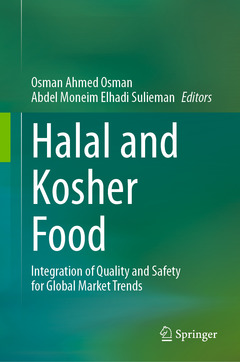Halal and Kosher Food, 1st ed. 2023 Integration of Quality and Safety for Global Market Trends
Coordonnateurs : Ahmed Osman Osman, Moneim Elhadi Sulieman Abdel

In both Islamic and non-Islamic countries many population groups worldwide, such as vegetarians and people of the Jewish faith, consumers do not eat pork. Amongst these groups consumers are concerned about importing processed food which may contain or has been contaminated with pork or swine-derived products. This is especially true of halal foods in Muslim communities where the foods may be prepared or processed utilizing one of more non-halal ingredients. Halal and kosher foodstuff play an incredibly important role in the Muslim and Jewish diet, economy and health. This makes halal and kosher food product quality, safety and shelf life preservation a major topic in these communities and for the manufacturers of halal and kosher food products.
Halal and Kosher Food: Integration of Quality and Safety for Global Market Trends covers a wide range of important topics in halal foods including quality, standards, safety of food additives, antimicrobial and veterinary drug residues, aflatoxin in feedstuff, application of Hazards Analysis and critical Control Points (HACCP). Important data regarding halal and kosher food similarities and differences are covered in full. Best practices in halal food product manufacturing are covered, plus the importance of halal food safety for consumer health. Written by elite international halal food experts, this work differs from other books on the subject which focus on history, legislation and certification. Readers can utilize this book as an orientation and practical guidebook to recognize the quality and safety of halal food products.
1
The importance of halal food and its legality in both Islamic and non-Islamic communities around the world
Osman Ahmed Osman
2
Dilemma and Concepts of Halal-Safe Food
Abdellatif Eldaw and Osman Ahmed Osman
3
Metrology's Importance and Application in the Halal Food Assurance SystemOsman Ahmed Osman and Tamador Salih Saeed
4
Concept and Significance of the Halal Traceability System
Mohamed Elwathig Saeed Mirghani and Ahmed Adam. M. Elnour
5
Kosher and halal food dissimilarities and challenges in accessing international markets
Osman Ahmed Osman
6
One Health- new approach towards halal food safety
Adil Mohamed Ahmed Salman
7
Laboratory Methods for authenticating conformity of Halal Foods
Muna Saad M S Al Olan and Aneez Ahamad Padippurathundil Yossouff
8
Models for risk analysis applicable to Halal food products
Adil Mohamed Ahmed Salman
9
Halal and kosher slaughter procedures in livestock and poultryTwadu Ali Saeed, Sit Albanat Mohd Elhassan Ali and Osman Ahmed Osman
10
The origins, usage, and production methods of halal and kosher gelatin
Nahid Ahmed Osman and Hala Mohamed Abo-Dief11
Fraud on Halal food: principles, quality challenges, and safety concerns.
Osman Ahmed Osman
12
Standards and their application to the production, manufacture, and storage of halal food.
Osman Ahmed Osman13
Fermentation techniques used to enhance the quality of halal food products
Abdel Moneim Elhadi Sulieman 14Principles and techniques of sensory evaluation for assessing the quality of halal foods
Onaheid Ahmed Osman, Abdel Moneim Elhadi Sulieman and Osman Ahmed Osman
15
Good practices: Conception and implementation through the Halal food supply chain
Twadu Ali Saeed.16
Contamination of Halal Beef Carcasses by Bacteria Grow or Survive During Cold Storage
Abdel Moneim E. Sulieman, Isam M. Abu Zeid, and Awatif Haddad17
Inherent and extrinsic factors related to the shelf life of halal food stuff
Osman Ahmed Osman and Abdel Moneim Elhadi Sulieman18
Impact of fluctuating storage temperatures on the sensory and microbiological quality of halal beef products.
Abdel Moneim Elhadi Sulieman, Osman Ahmed Osman, Zakaria Ahmed Saleh, and Onaheed Ahmed Osman19
Food additives and their applications in the production of halal and kosher foods
Twadu Ali Saeed20
The origin of enzymes and their applications in the production of specific halal products
Walied Abdelrahman Mustafa , Osman Ahmed Osman Twadu Ali Saeed and Ahmed Elawad Elfaki Mohamed Ahmed
21
Pesticides Maximum Residues Levels (MRLs) in Halal Food
Moawya Ibrahim Yousif Abdalla, Abdel Moneim Elhadi Sulieman Marwa Mohamed Eisa Eltohami and Isam M. Abu Zeid22
The prevalence of microorganisms and their impact on the wholesomeness of particular Nile fish and fish products
Onaheed Ahmed Osman, Abdel Moneim Elhadi Sulieman, Walied Abdelrahman Mustafa, Osman Ahmed Osman23
Significant risk of Shiga toxin-producing E. coli in certain halal foods
Saria Abdel Rahman Mohammed Saeed24
Antimicrobial resistance: Challenges and Incidence in Various Halal Food Products
Thamar Elamin Abdalla25
Manufacturing Procedures for Controlling Harmful Microorganisms in Halal Chicken Meat Products
Abdel Moneim Elhadi Sulieman and Isam Abuzeid
26
Effects of heavy metal contamination on the safety of halal foodstuffs
Hind Abdel Aziz Elnasri and Intisar Ahmed Mohamed Osman
27
Veterinary drugs acceptable maximum residue levels in halal foodsIshraga Gaafar Ibrahim.
28
The incidence of aflatoxin in feedstuff and foodstuff and its significances on the wholsomnness of halal food
Ibtisam E. M. El Zubeir
29
Non-alcoholic drink safety and halal certification
Osman Ahmed Osman30
Production of Halal Meat Using HACCP System: Idea and Implementation
Elniema Abdelkhalig MustafaDr. Osman Ahmed Osman works for the Department of Standards, Qatar General Organization for Standardization in Doha, Qatar and the Department of Research of the Sudanese Standards and Metrology Organization in Khartoum, Sudan.
Prof. Dr. Abdel Moneim Elhadi Sulieman is a Professor in the Department of Biology, College of Science at the University of Hail in the Kingdom of Saudi Arabia and the Department of Food Engineering and Technology, Faculty of Engineering and Technology at Wad-Medani, Sudan.
Provides important data regarding halal and kosher food similarities and differences
Outlines best practices in halal food product manufacturing
Covers a wide range of important topics in halal and kosher foods
Date de parution : 10-2023
Ouvrage de 411 p.
15.5x23.5 cm
Disponible chez l'éditeur (délai d'approvisionnement : 15 jours).
Prix indicatif 189,89 €
Ajouter au panierThèmes de Halal and Kosher Food :
Mots-clés :
Halal Food; Kosher Foods; Halal Food Safety; Halal Food Standards; Halal Food Fraud



